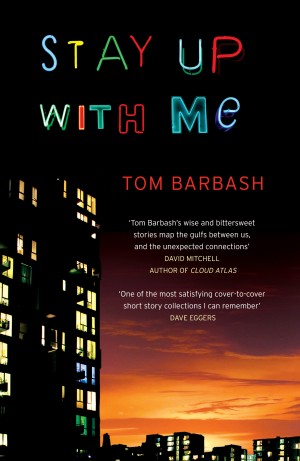You have no items in your cart. Want to get some nice things?
Go shopping Tom Barbash has an interesting angle on human nature. He watches his characters in their heightened emotional states — disdainful, jealous, displaced, full of angst, insecure, abandoned — and observes how their feelings make them behave.
Tom Barbash has an interesting angle on human nature. He watches his characters in their heightened emotional states — disdainful, jealous, displaced, full of angst, insecure, abandoned — and observes how their feelings make them behave.
In “The Break”, a grown-up son goes to his mother’s flat for Christmas. The narrative voice tells the story from such a distance it doesn’t even call the characters by their names, brilliantly depicting the bleakness of the relationship.
In “Balloon Night”, a husband reflects on the hit-and-miss moments of his marriage as a he tries to hide the fact his wife has just left him while throwing a party for their friends and family. It is a witty story, full of well observed drunken dynamics and blurry flirtations, but poignant too.
There’s not much else to do where we live, being that it’s freezing cold half the year and I’m fifteen and too young to get into bars, which is what everyone else does. My mom says she’d rather I shoot drugs than watch TV, although that’s not true.
But character-driven stories need well drawn characters, and the characterisation in this collection is patchy. About halfway through the book the characters become paper thin — only interesting for their quirkiness or moral decrepitude.
Some of the stories feel like early drafts, as if they were written to a deadline, and rely on sentimentality to save them. Others lose their way “like a man who takes the wrong road on the way home and finds himself on a street very much like his but which doesn’t contain his house” (and use overblown metaphors).
“Howling at the Moon” for example, is a disjointed story held together by the (cringe-worthy) image of a boy and his mother howling at the moon. Perhaps its style is analogous to the dysfunctional mother-son relationship? But its best storyline (the son’s obsession with an absent girl whose clothes he tries on) is left hanging as if the author has forgotten about it.
“Somebody’s Son” is entertaining until the sentiment gets so heavy-handed — and the moral is spelled out so laboriously — it feels more like watching daytime telly than reading.
But “How to Fall” was the real low point — a soppy account of a drippy young woman ending one relationship and starting another — chicklit only without the weak comfort of some occasional, albeit awkward, humour.
Weirdly though, after it troughs this collection not only takes off again, it soars.
She was the one who’d finish the Sunday crossword puzzle, who knew word derivations, who could speak three languages, who had more persuasive things to say about the films and plays we went to.
The title story, “Stay Up With Me”, is brilliant. The protagonist is nuanced and sympathetic, his life is complex and his internal conflict, guilt about his father, resentment towards his mother, utterly believable. “Birthday Girl” is exquisite, delicately telling the aftermath of a road accident from the point of view of the driver responsible. The Women is full of dark humour as a father and son handle their grief for their late wife/mother in very different ways.
Barbash is hugely talented and in some of his stories shows exceptional skill. Maybe that’s why the inadequate ones, the ones that don’t feel finished, are so very disappointing.

About Juno Baker
Juno Baker is a freelance writer, and editor of the University of Cambridge's Leading Change website. She has written articles for the Guardian and once interviewed Dolly Parton. Her fiction has been placed in several competitions – including Winchester Writers Festival, Pindrop, Short Fiction and Rubery – and was recently shortlisted for the VS Pritchett Short Story Prize. Her stories have also appeared in numerous magazines and anthologies, most recently, Mslexia, Unthology and Litro.
- Web |
- More Posts(13)




